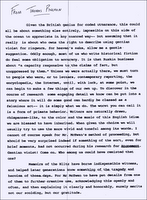 The fallout from the Ian McEwan did-he-or-didn't-he
The fallout from the Ian McEwan did-he-or-didn't-he-plagiarise-and-anyway-does-it-matter debate continues.
The Independent reports that: ...
Lucilla Andrews' 30-year-old book No Time for Romance, previously on sale on Amazon for $12.50, has jumped to $2,185.71 (£1,100).Novelists from the usually reclusive Thomas Pynchon to Zadie Smith have leapt passionately to McEwan's defense, and yesterdays' Times lists their statements. The most succinct is Martin Amis:
Historical fiction – as opposed to historical fantasy – cannot be written without help from historical sources. The novelist acknowledges that help, with gratitude, and the world moves on.while the snippiest is Margaret Atwood who offers the lovely expression "flea-hitching" to posterity. ('Scuse me while I scratch.)
Meanwhile Ben McIntire finds himself "in bed with McEwan" and quite enjoying it.
Natasha Alden, the PhD student whose research started the furor explains the purpose of her research and the questions it has thrown up about the right and proper way of using other people's writing. She notes:
It is very difficult for anyone not to be influenced by vivid and well written words and not to replicate them, consciously or unconsciously. The novel is a hybrid form – based in reality, but making something new; this is particularly apparent in historical novels. Historical details, as McEwan has said, bring life and vigour to fiction. The imagination is crucial, but research brings truth. So what is the novelists’ responsibility to their sources? How can a contemporary novel speak to the past, or speak out of it ...?(I do hope Ms. Alden eventually turns her thesis into a book. I'd want to buy it.)
Of all the musings on the topic, I most enjoyed Robert McCrum's article in last Sunday's Observer. (Shakespeare a pickpocket?)
So the jury has delivered its judgment. It is a much comforting one for all fictionators. And the whole business has created an entertaining little side-show for the last few days.
Perhaps now poor Mr. McEwan can go back to his work.
(Above: Pynchon's letter pinchoned from McEwan's website. All in the interest of research, you understand. Click and click to read.)
10 comments:
Pynchon or Pyncheon? The net seems to have both versions.
yeah, you're right, without the e. was just about to check it too ...
God bless Martin Amis.
all of you probably know the theory that shakespeare's works were written by christopher marlowe (alledgedly) in hiding.
either that or shakespeare 'plagiarized' marlowe (again, alledgedly): some of the lines in their plays are similar.
A prose by any other name...
Wow! Seemed like pretty big news! I didn't even know anything about this prior to reading the entry. Awesome to see all these literary giants jumping into Ian McEwan's defense.
BTW: Sharon, check this out, you MIGHT love this site I was talking about :D Ahh, back in Malaysia.
I believe that Umberto Eco's The Mysterious Flame of Queen Luana comes close to what Natasha Alden describes... was in the middle of it when I left KL, and now really missing it.
Hey Guardian is right.. it's a troll to generate publicity for the film..from the looks of it it worked pretty well :)
vigdNatasha is my cousin, and I can tell you for a fact that when all this came out, and in the way it has, she has been surprised not a little shocked by the passions it has raised on all sides. She at no time accused Ian of plagiarism, a fact she makes quite clear in one of the links to the Times Online included in this blog. For the lazy here is the link:-
http://www.timesonline.co.uk/article/0,,923-2493253,00.html
I was made aware of this whole issue last year while Natasha was discussing her PhD thesis with me. Like a lot of things in the media her words have been taken and used out of context by others.
I personally think this issue raises all kinds of ethical issues for authors of fiction (historical or otherwise), which are if and then how you go in acknowledge your sources,and then if & how you tell your sources of that use if they are still alive. That at the end of the day is what this whole row boils down too. Indeed it was that very point that Lucilla Andrews herself was hoping to to make in speech she was planning to make. She unfortunately died before she could do so.
I too hope that Natasha decides to and can then get her thesis published, so as to put the whole of this issue in it's proper academic context, it is actually a very small part of her overall thesis!
anonymous - i'm very happy that you stopped by to post this!
Like a lot of things in the media her words have been taken and used out of context by others. yes, it certainly looks that way.
personally think this issue raises all kinds of ethical issues for authors of fiction (historical or otherwise), yes, it does. i find the whole discussion - not just about plagiarism but about how authors research and use their historical sources fascinating. i guess all those who love literature want a peep under the bonnet!
i'm very happy the issue came up in another sense - i feel vindicated now about taking tasty morsels from other sources for my own fictions! watch out world!
the blaze of publicity for natasha must have been pretty scary. but she may have a bestseller on her hands if her thesis gets published. wish her good luck from me!
Post a Comment